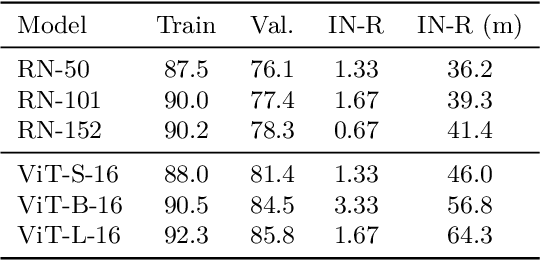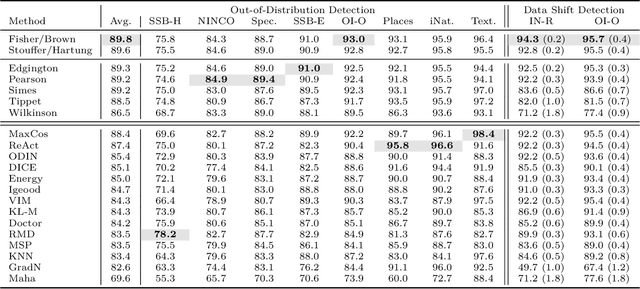Florence Alberge
Combine and Conquer: A Meta-Analysis on Data Shift and Out-of-Distribution Detection
Jun 23, 2024



Abstract:This paper introduces a universal approach to seamlessly combine out-of-distribution (OOD) detection scores. These scores encompass a wide range of techniques that leverage the self-confidence of deep learning models and the anomalous behavior of features in the latent space. Not surprisingly, combining such a varied population using simple statistics proves inadequate. To overcome this challenge, we propose a quantile normalization to map these scores into p-values, effectively framing the problem into a multi-variate hypothesis test. Then, we combine these tests using established meta-analysis tools, resulting in a more effective detector with consolidated decision boundaries. Furthermore, we create a probabilistic interpretable criterion by mapping the final statistics into a distribution with known parameters. Through empirical investigation, we explore different types of shifts, each exerting varying degrees of impact on data. Our results demonstrate that our approach significantly improves overall robustness and performance across diverse OOD detection scenarios. Notably, our framework is easily extensible for future developments in detection scores and stands as the first to combine decision boundaries in this context. The code and artifacts associated with this work are publicly available\footnote{\url{https://github.com/edadaltocg/detectors}}.
Beyond the Norms: Detecting Prediction Errors in Regression Models
Jun 11, 2024Abstract:This paper tackles the challenge of detecting unreliable behavior in regression algorithms, which may arise from intrinsic variability (e.g., aleatoric uncertainty) or modeling errors (e.g., model uncertainty). First, we formally introduce the notion of unreliability in regression, i.e., when the output of the regressor exceeds a specified discrepancy (or error). Then, using powerful tools for probabilistic modeling, we estimate the discrepancy density, and we measure its statistical diversity using our proposed metric for statistical dissimilarity. In turn, this allows us to derive a data-driven score that expresses the uncertainty of the regression outcome. We show empirical improvements in error detection for multiple regression tasks, consistently outperforming popular baseline approaches, and contributing to the broader field of uncertainty quantification and safe machine learning systems. Our code is available at https://zenodo.org/records/11281964.
Igeood: An Information Geometry Approach to Out-of-Distribution Detection
Mar 15, 2022



Abstract:Reliable out-of-distribution (OOD) detection is fundamental to implementing safer modern machine learning (ML) systems. In this paper, we introduce Igeood, an effective method for detecting OOD samples. Igeood applies to any pre-trained neural network, works under various degrees of access to the ML model, does not require OOD samples or assumptions on the OOD data but can also benefit (if available) from OOD samples. By building on the geodesic (Fisher-Rao) distance between the underlying data distributions, our discriminator can combine confidence scores from the logits outputs and the learned features of a deep neural network. Empirically, we show that Igeood outperforms competing state-of-the-art methods on a variety of network architectures and datasets.
 Add to Chrome
Add to Chrome Add to Firefox
Add to Firefox Add to Edge
Add to Edge